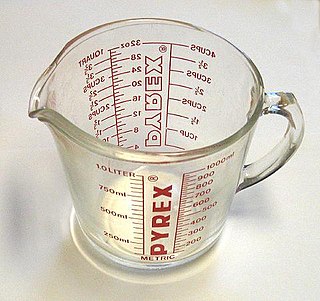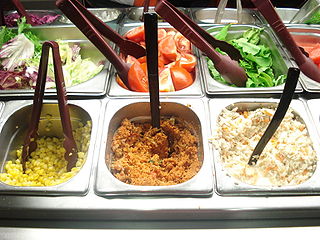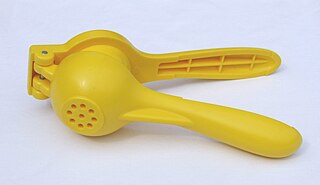
Pyrex is a brand introduced by Corning Inc. in 1915, initially for a line of clear, low-thermal-expansion borosilicate glass used for laboratory glassware and kitchenware. It was later expanded in the 1930s to include kitchenware products made of soda–lime glass and other materials. Its name has become famous for making rectangular glass roasters.

Kitchenware refers to the tools, utensils, appliances, dishes, and cookware used in food preparation and the serving of food. Kitchenware can also be used to hold or store food before or after preparation.

A kitchen knife is any knife that is intended to be used in food preparation. While much of this work can be accomplished with a few general-purpose knives — notably a large chef's knife and a smaller serrated blade utility knife — there are also many specialized knives that are designed for specific tasks such as a tough cleaver, a small paring knife, and a bread knife. Kitchen knives can be made from several different materials, though the commonest is a hardened steel blade with a wooden handle.

A reverse vending machine (RVM) is a machine that allows a person to insert a used or empty glass bottle, plastic bottle, or aluminum can in exchange for a reward. After inserting the recyclable item, it is then compacted, sorted, and analyzed according to the number of ounces, materials, and brand using the universal product code on the bottle or can. Once the item has been scanned and approved, it is then crushed and sorted into the proper storage space for the classified material. Upon processing the item, the machine rewards people with incentives, such as cash or coupons.
WÜSTHOF is a knife-maker based in Solingen, Germany. Family owned for seven generations, the company's main products are mid-priced to high-end kitchen knives for domestic and professional use. WÜSTHOF is one of the leading manufacturers of chef's knives.

Glass recycling is the processing of waste glass into usable products. Glass that is crushed or imploded and ready to be remelted is called cullet. There are two types of cullet: internal and external. Internal cullet is composed of defective products detected and rejected by a quality control process during the industrial process of glass manufacturing, transition phases of product changes and production offcuts. External cullet is waste glass that has been collected or reprocessed with the purpose of recycling. External cullet is classified as waste. The word "cullet", when used in the context of end-of-waste, will always refer to external cullet.

FKI is a British engineering and manufacturing company headquartered in Loughborough, Leicestershire. For many years listed on the London Stock Exchange and a constituent of the FTSE 250 Index, it was taken private by buyout firm Melrose in July 2008.

Bodum, Inc. is a Danish-Swiss kitchenware manufacturer headquartered in Triengen, Switzerland. Founded in Copenhagen, Denmark, in 1944 by Peter Bodum, the company was moved to Switzerland in 1978 by his son, Jørgen, who continued to run the company as chief executive.

Gastronorm (GN), sometimes spelled Gastro-Norm, is a European standard for kitchenware tray and container sizes that is commonly seen worldwide in the catering and professional food industry, as well as in certain parts of the high-end consumer market. Gastronorm is generally used worldwide except in most of the United States and Canada, which have their own domestic systems. The gastronorm standard was first introduced in Switzerland in 1964 and became an official European standard in 1993 with the EN 631 standard.
Füritechnics Pty Ltd is an Australian manufacturer and developer of kitchen knives that sells under the abbreviated name Füri.

Recycling codes are used to identify the materials out of which the item is made, to facilitate easier recycling process. The presence on an item of a recycling code, a chasing arrows logo, or a resin code, is not an automatic indicator that a material is recyclable; it is an explanation of what the item is made of. Codes have been developed for batteries, biomatter/organic material, glass, metals, paper, and plastics. Various countries have adopted different codes. For example, the table below shows the polymer resin (plastic) codes. In the United States there are fewer, because ABS is placed with "others" in group 7.

In 2015, 43.5% of the United Kingdom's municipal waste was recycled, composted or broken down by anaerobic digestion. The majority of recycling undertaken in the United Kingdom is done by statutory authorities, although commercial and industrial waste is chiefly processed by private companies. Local Authorities are responsible for the collection of municipal waste and operate contracts which are usually kerbside collection schemes. The Household Waste Recycling Act 2003 required local authorities in England to provide every household with a separate collection of at least two types of recyclable materials by 2010. Recycling policy is devolved to the administrations of Scotland, Northern Ireland and Wales who set their own targets, but all statistics are reported to Eurostat.

The blue box recycling system (BBRS) was initially a waste management system used by Canadian municipalities to collect source separated household waste materials for the purpose of recycling. The first full-scale community wide BBRS was implemented in 1983 by the waste management contractor Ontario Total Recycling Systems Ltd. for the City of Kitchener, Ontario. The blue box recycling system was implemented as part of the city's waste management procedures. The blue box system and variations of it remain in place in hundreds of cities around the world.

A kitchen utensil is a small hand-held tool used for food preparation. Common kitchen tasks include cutting food items to size, heating food on an open fire or on a stove, baking, grinding, mixing, blending, and measuring; different utensils are made for each task. A general purpose utensil such as a chef's knife may be used for a variety of foods; other kitchen utensils are highly specialized and may be used only in connection with preparation of a particular type of food, such as an egg separator or an apple corer. Some specialized utensils are used when an operation is to be repeated many times, or when the cook has limited dexterity or mobility. The number of utensils in a household kitchen varies with time and the style of cooking.

A lemon squeezer is a kitchen utensil designed to extract juice from lemons or other citrus fruit such as oranges, grapefruit, or lime. It is designed to separate and crush the pulp of the fruit in a way that is easy to operate. Lemon squeezers can be made from any solid, acid-resistant material, such as plastic, glass, metal or ceramic.

Disposable food packaging comprises disposable products often found in fast-food restaurants, take-out restaurants and catering establishments. Typical products are foam food containers, plates, bowls, cups, utensils, doilies and tray papers. These products can be made from a number of materials including plastics, paper, bioresins, wood and bamboo.

Repurposing is the process by which an object with one use value is transformed or redeployed as an object with an alternative use value.
Resource recovery is using wastes as an input material to create valuable products as new outputs. The aim is to reduce the amount of waste generated, thereby reducing the need for landfill space, and optimising the values created from waste. Resource recovery delays the need to use raw materials in the manufacturing process. Materials found in municipal solid waste, construction and demolition waste, commercial waste and industrial wastes can be used to recover resources for the manufacturing of new materials and products. Plastic, paper, aluminium, glass and metal are examples of where value can be found in waste.
Orthex Oyj is a Finnish company that manufactures and markets plastic household products such as storage boxes, kitchenware and utensils. Orthex has manufactured some of the very common items in Finnish homes. In the example over 8 of 10 households owned the Orthex freezer box Jäänalle and the 10-liter bucket according to a survey conducted by Ilta-Sanomat in 2019. Orthex's classic sled was described as the most common kids sled over the years by Helsingin Sanomat in 2005.














